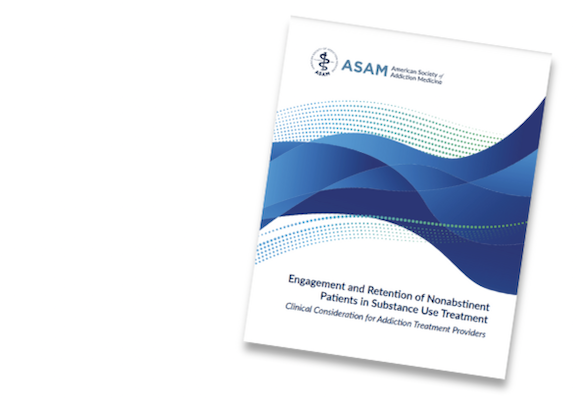Clinical Guidance
Engagement and Retention of Nonabstinent Patients in Substance Use Treatment
Clinical Consideration for Addiction Treatment Providers
Read the Guest Editorial
Engagement and Retention of Nonabstinent Patients in Substance Use Treatment
Clinical Consideration for Addiction Treatment Providers
Background
Initiation, engagement, and retention in treatment are critical factors that impact long-term outcomes for substance use disorders (SUDs); early treatment engagement and longer durations of treatment predict better clinical outcomes. Despite this, patients are regularly dissuaded from initiating treatment until they commit to full sustained abstinence from all intoxicants, and too frequently are administratively discharged from SUD treatment programs during instances of substance use recurrence. This document was developed to provide SUD treatment programs and providers with guidance and support to: 1) address the complexities of patient nonabstinence during treatment; 2) reduce administrative discharges; and 3) implement strategies focused on lowering barriers to care to improve engagement and retention of nonabstinent patients in the continuum of care.
This project is funded by the California Department of Health Care Services.
Summary of Recommendations
- Cultivate patient trust by creating a welcoming, nonjudgmental, and trauma-sensitive environment
- Do not require abstinence as a condition of treatment initiation or retention
- Optimize clinical interventions to promote patient engagement and retention
- Only administratively discharge patients from treatment as a last resort
- Seek to re-engage individuals who disengage from care
- Build connections to people with SUD who are not currently seeking treatment
- Cultivate staff acceptance and support
- Prioritize retention of front-line staff
- Align program policies and procedures with the commitment to improve engagement and retention of all patients, including nonabstinent patients
- Measure progress and strive for continuous improvement of engagement and retention
Literature Review and Funding
Funding for this project was provided by the California Department of Health Care Services. The Expert Committee members, listed below, applied and were selected by ASAM’s Quality Improvement Council (members listed below). A targeted literature review was conducted on the evidence regarding engagement and retention in addiction treatment and was used to inform the deliberations of the committee. The final document was reviewed and approved by the 探花合集 Quality Improvement Council and Board of Directors.
Expert Committee
Gary Tsai, MD, DFAPA, FASAM
ASAM Quality Improvement Council
Field Reviewers
Staff and Author Contribution
Supplemental Materials
A description of the methodology and disclosures of interest is available for download.
